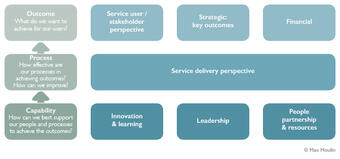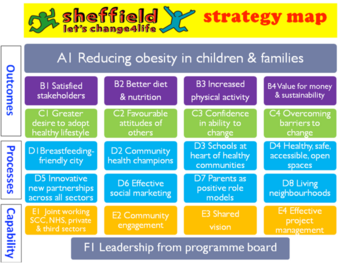
Mapping strategy with the public sector scorecard
Progress indicator

Max Moullin, CQP FCQI, describes how the public sector scorecard can help members working in the sector to develop strategy, improve outcomes and monitor performance
Most public and third sector organisations are struggling with two major problems: improving outcomes for service users and other key stakeholders without increasing overall cost, and developing measures of performance to improve and assure quality without arbitrary targets at the expense of poor service to the public.
The public sector scorecard (PSS) is an integrated strategy mapping, service improvement, and performance measurement framework specially designed for these sectors. It is an ideal approach to addressing these problems.
Originally developed in 2002, it has been used in many countries and has proved particularly useful in working across organisational boundaries, for example, health and social care.
The scorecard has been described by the Operational Research Society as: “Moving performance management from a top-down, blinkered, blame-game approach to a system founded on inclusiveness, cooperation and understanding” (Robinson, 2015).
The seven perspectives of the public sector scorecard

The PSS has seven perspectives. It begins by identifying, in a workshop environment, the outcomes the organisation is looking for – strategic outcomes, service user and stakeholder outcomes, and financial outcomes such as value for money.
Next, processes and service delivery are examined, perhaps with the aid of systems thinking or process mapping. Finally, capability aspects such as partnership working, staff support and motivation, resources, a culture of innovation and learning, and effective leadership are considered. The linkages between outcomes, processes and capability are then put together in a strategy map.
The strategy map for Sheffield Let’s Change4Life (SLC4L), a £10m programme addressing child obesity, is shown below. It was developed following interactive workshops with the Programme Board, leaders and stakeholders of the eight strands of the programme, and Sheffield Youth Council.
The main outcomes required are shown in the first two rows, while the third row is the result of integrating the scorecard with the Theory of Planned Behaviour (a psychological theory linking beliefs and behaviour) and shows how the programme aimed to change people’s behaviour. The following two rows refer to the eight strands of SLC4L, while the last two rows show the capability and organisational aspects that needed to be achieved including joint working and a shared vision. Performance measures were also developed for each element of the strategy map and used in the evaluation.
Strategy map for Sheffield Let’s Change4Life

Sheffield City Council’s executive director for children, young people, and families, Jayne Ludlam, said: “The PSS strategy map is really useful as it simplifies a complex issue with a complex response into an orderly understandable approach.”
The programme director, Carol Weir, said: “The SLC4L Strategy Map visually told the story of SLC4L. It helped all those involved understand the outcome and process measures the programme was trying to achieve, and therefore being evaluated against.”
CQI members working in the public and third sectors should seriously consider using the outcomes-focussed PSS to help develop their strategy further, improve service delivery, and ensure performance measures are clearly linked to the outcomes required and evidence-based drivers of those outcomes.
As John Soady of Sheffield City Council revealed: “The PSS model is amenable to complexity and able to incorporate core characteristics of citizen involvement, partnership and integration. It enables the construction of a balanced metrics panorama at the system level, from which performance dashboards can be modelled.”
Max Moullin, CQP FCQI, is director of the Public Sector Scorecard Research Centre and also a visiting fellow at Sheffield Business School where he was a principal lecturer in Quality Management for over 25 years.
References
Moullin, M. (2002) Delivering Excellence in Health and Social Care, Open University Press, Buckingham.
Moullin, M and Copeland, R (2013) Implementing and evaluating behaviour change programmes with the Public Sector Scorecard. National Health Executive, Jul-Aug 2013, pp16-18.
Robinson, N. (2015) Developing strategy in the Public Sector, IMPACT, Issue 2, pp 39-43, The Operational Research Society.
Attend the Masterclass
The Public Sector Scorecard masterclass will be held in Sheffield on 17 November 2016.
Member only

This article is free to access for a limited time only. Only CQI and IRCA members receive access to all content.


